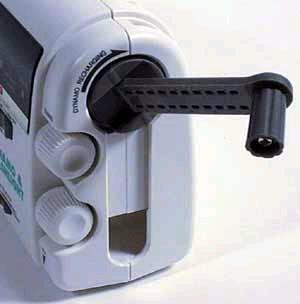 In 1993, Trevor watched a program about the spread of AIDS in Africa. The program observed that in many parts of of Africa, radio was the only available means of communication. Thus creating a need for batteries and electricity that made them too expensive for the impoverished people.
In 1993, Trevor watched a program about the spread of AIDS in Africa. The program observed that in many parts of of Africa, radio was the only available means of communication. Thus creating a need for batteries and electricity that made them too expensive for the impoverished people.Trevor picked up on the word need. In his workshop at home he experimented with a hand brace, an electric motor and a small radio. He found that the brace turning a the motor would act as a generator that would supply sufficient electricity to power the radio. The addition of a clockwork mechanism meant that a spring could be wound up and that as the spring unwound the radio would play. His first working prototype ran for 14 minutes on a two minute wind. Trevor had invented a clockwork (windup) radio!
Trevor attempted to promote his invention, but manufacturers were not convinced of its commercial value. After many rejections Trevor got lucky. In April 1994 Trevor's' invention was featured on on the BBC program 'Tomorrow's World'. The product's potential was immediately recognized by corporate accountant Christopher Staines and South African entrepreneur Rory Stear. In South Africa, the details of the invention were broadcast over a Johannesburg radio station. The new radio had been designed specially for the Western consumer market and would run for up to an hour with a thirty second wind.
The BBC program 'QED' filmed and broadcast an award winning documentary about Trevor's development of the radio. He was awarded the President's Medal by the Institute of Mechanical Engineers and addressed the Conference of Commonwealth Ministers in Botswana for the British Council. In October, Trevor was awarded the OBE by The Princess Royal at Buckingham Palace, and was featured in an edition of "This Is Your Life".




No comments:
Post a Comment